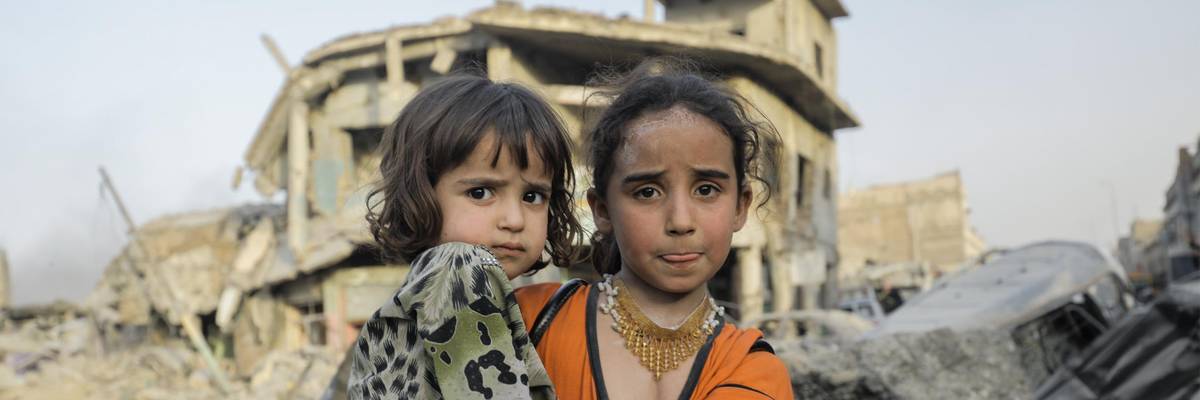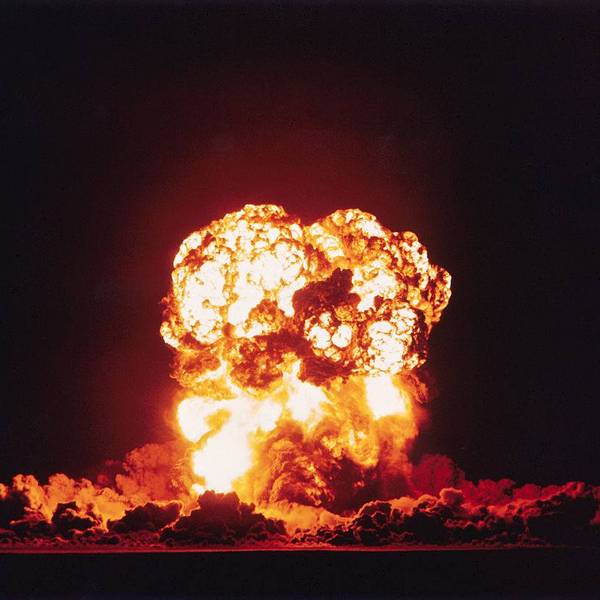
Two young girl seen at the destroyed city of Mosul, Iraq. (Photo: Afshin Ismaeli/SOPA Images/LightRocket via Getty Images)
War Will Continue Until We Stop It
The bombs were different: American not Russian. Thirty years on, as we watch another wrecking, another invasion, another horror, do we choose to remember or do we choose to forget?
The invasion ended in February, and soon after, I visited what had been a gleaming city. Light still glinted off towering office buildings, six lane highways still sped international traffic in and out. Public parks offered shade and modern art and manicured gardens where older women walked with children and bought ice cream and pastries from roadside carts.
A high school sophomore invited me to dinner with her family in a tree-lined neighborhood a short distance from my hotel by bus. Their house overlooked the city. She described the sparkling of the commercial center at night. In the days before the war, she'd held her sweet sixteen party in a hotel ballroom downtown. She still had the cream-colored dress.
The young woman's English was perfect. She adored Shakespeare. She had hoped to apply to study in Oxford. But that was before the war.
Several of the girl's friends had studied abroad, as had the doctor I'd met earlier that day. White coat, silvering hair at the temples, he had not only studied but taught in most of the capitals in Europe. A pediatric heart surgeon, his work in his state-of-the-art hospital had saved patients from across the region.
War wrecked that modern city, bombed its water plants, and targeted its grid. "Overnight, our modern lives were over," said the girl.
No more Shakespeare. No more pediatrics. The celebrated heart surgeon's time was now devoted to keeping kids in incubators warm when the electricity shut off.
The girl's name could have been Maria or Kateryna or Anastasia. It was Manar.
Not Ukrainian but Iraqi, she was born in Baghdad, not Kyiv. Manar was just as modern, outward looking and innocent--and her life was just as wrecked--as the Marias whose lives are being wrecked right now.
The bombs were different: American not Russian. Thirty years on, as we watch another wrecking, another invasion, another horror, do we choose to remember or do we choose to forget?
Prison abolitionist Mariame Kaba says of struggle, "We do this 'til we free us." Likewise, it seems to me, war is 'til we stop it. We need to stop it.
You can watch my show every week on Public Television or hear the radio program on community radio stations across the country. Get information, and subscribe to the free podcast at lauraflanders.org.
An Urgent Message From Our Co-Founder
Dear Common Dreams reader, The U.S. is on a fast track to authoritarianism like nothing I've ever seen. Meanwhile, corporate news outlets are utterly capitulating to Trump, twisting their coverage to avoid drawing his ire while lining up to stuff cash in his pockets. That's why I believe that Common Dreams is doing the best and most consequential reporting that we've ever done. Our small but mighty team is a progressive reporting powerhouse, covering the news every day that the corporate media never will. Our mission has always been simple: To inform. To inspire. And to ignite change for the common good. Now here's the key piece that I want all our readers to understand: None of this would be possible without your financial support. That's not just some fundraising cliche. It's the absolute and literal truth. We don't accept corporate advertising and never will. We don't have a paywall because we don't think people should be blocked from critical news based on their ability to pay. Everything we do is funded by the donations of readers like you. Will you donate now to help power the nonprofit, independent reporting of Common Dreams? Thank you for being a vital member of our community. Together, we can keep independent journalism alive when it’s needed most. - Craig Brown, Co-founder |
The invasion ended in February, and soon after, I visited what had been a gleaming city. Light still glinted off towering office buildings, six lane highways still sped international traffic in and out. Public parks offered shade and modern art and manicured gardens where older women walked with children and bought ice cream and pastries from roadside carts.
A high school sophomore invited me to dinner with her family in a tree-lined neighborhood a short distance from my hotel by bus. Their house overlooked the city. She described the sparkling of the commercial center at night. In the days before the war, she'd held her sweet sixteen party in a hotel ballroom downtown. She still had the cream-colored dress.
The young woman's English was perfect. She adored Shakespeare. She had hoped to apply to study in Oxford. But that was before the war.
Several of the girl's friends had studied abroad, as had the doctor I'd met earlier that day. White coat, silvering hair at the temples, he had not only studied but taught in most of the capitals in Europe. A pediatric heart surgeon, his work in his state-of-the-art hospital had saved patients from across the region.
War wrecked that modern city, bombed its water plants, and targeted its grid. "Overnight, our modern lives were over," said the girl.
No more Shakespeare. No more pediatrics. The celebrated heart surgeon's time was now devoted to keeping kids in incubators warm when the electricity shut off.
The girl's name could have been Maria or Kateryna or Anastasia. It was Manar.
Not Ukrainian but Iraqi, she was born in Baghdad, not Kyiv. Manar was just as modern, outward looking and innocent--and her life was just as wrecked--as the Marias whose lives are being wrecked right now.
The bombs were different: American not Russian. Thirty years on, as we watch another wrecking, another invasion, another horror, do we choose to remember or do we choose to forget?
Prison abolitionist Mariame Kaba says of struggle, "We do this 'til we free us." Likewise, it seems to me, war is 'til we stop it. We need to stop it.
You can watch my show every week on Public Television or hear the radio program on community radio stations across the country. Get information, and subscribe to the free podcast at lauraflanders.org.
The invasion ended in February, and soon after, I visited what had been a gleaming city. Light still glinted off towering office buildings, six lane highways still sped international traffic in and out. Public parks offered shade and modern art and manicured gardens where older women walked with children and bought ice cream and pastries from roadside carts.
A high school sophomore invited me to dinner with her family in a tree-lined neighborhood a short distance from my hotel by bus. Their house overlooked the city. She described the sparkling of the commercial center at night. In the days before the war, she'd held her sweet sixteen party in a hotel ballroom downtown. She still had the cream-colored dress.
The young woman's English was perfect. She adored Shakespeare. She had hoped to apply to study in Oxford. But that was before the war.
Several of the girl's friends had studied abroad, as had the doctor I'd met earlier that day. White coat, silvering hair at the temples, he had not only studied but taught in most of the capitals in Europe. A pediatric heart surgeon, his work in his state-of-the-art hospital had saved patients from across the region.
War wrecked that modern city, bombed its water plants, and targeted its grid. "Overnight, our modern lives were over," said the girl.
No more Shakespeare. No more pediatrics. The celebrated heart surgeon's time was now devoted to keeping kids in incubators warm when the electricity shut off.
The girl's name could have been Maria or Kateryna or Anastasia. It was Manar.
Not Ukrainian but Iraqi, she was born in Baghdad, not Kyiv. Manar was just as modern, outward looking and innocent--and her life was just as wrecked--as the Marias whose lives are being wrecked right now.
The bombs were different: American not Russian. Thirty years on, as we watch another wrecking, another invasion, another horror, do we choose to remember or do we choose to forget?
Prison abolitionist Mariame Kaba says of struggle, "We do this 'til we free us." Likewise, it seems to me, war is 'til we stop it. We need to stop it.
You can watch my show every week on Public Television or hear the radio program on community radio stations across the country. Get information, and subscribe to the free podcast at lauraflanders.org.

